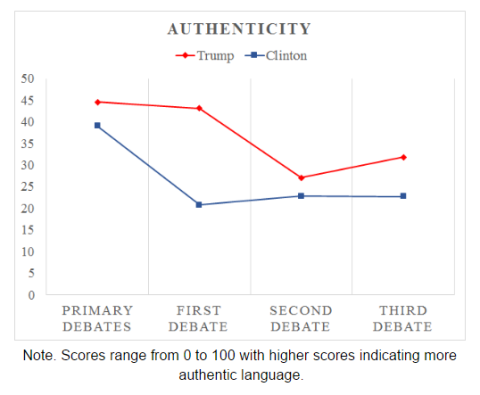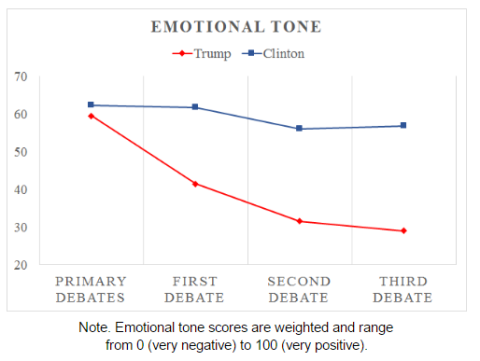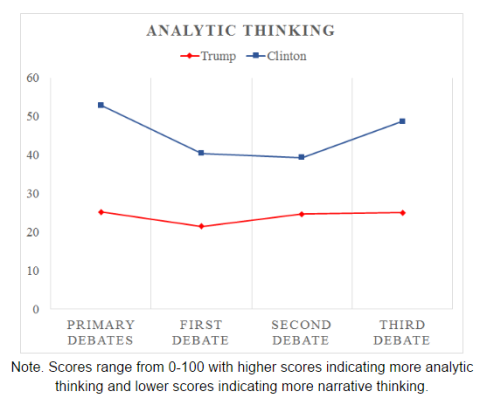A Look into the Final Clinton-Trump Debate
October 19, 2016
Kayla N. Jordan
University of Texas at Austin
Last night Hillary Clinton and Donald Trump debated for the final time before election day. Since the first debate of the general election, Clinton has been steadily gaining ground while Trump has been bogged down in scandals and conflict. Have their changes in circumstance influenced their language? Has Trump become less authentic? Has Clinton become even more positive? Here we analyze the candidates’ authenticity, emotional tone, and analytic thinking one last time as the election comes to a close.
Authenticity
As we discussed in the post on the first presidential debate, people who are authentic tend to use I-words, present-tense verbs, and relativity words more and she-he words and discrepancies less. In the primary debates, both Clinton and Trump spoke relatively straightforward manner. In the general election debates, the candidates have changed direction.
As shown in the graph below, Clinton has been consistently inauthentic in the general election debates. In the midst of multiple recurrent scandals and criticisms of her aloof personality, Clinton can sound evasive and inauthentic as she tries sidestep attacks and appeal to a wider range of voters. On the other hand, Trump remained straightforward and authentic in the first debate. However, after the major scandal with the leaked audio and sexual assault allegations, Trump’s authenticity in the last two debates has been markedly lower. The latest scandals seem to have hurt Trump’s ability to “tell it like it is.”

Emotional Tone
Since the general election debates have begun, Clinton and Trump have differed widely in their emotional tone. Clinton has maintained her upbeat, positive outlook from the primaries while Trump has developed an increasingly dark, pessimistic tone. Did the candidates change at all in the final debate?
Looking at the graph below, both candidates are consistent with their past trends. No amount of personal attacks or scandal can shake Clinton’s sense of optimism. She stays on her message that America is already great and she can help make it better. Trump, on the other hand, continued his pessimistic decline. Trump paints a much darker view of America and aggressively meets challenges and criticisms.

Analytic Thinking
We have examined the candidates’ thinking styles at several points throughout the election cycle showing how some candidates are analytic, logical thinkers whereas others are more intuitive, narrative thinkers. Throughout the debates, Clinton and Trump have demonstrated strikingly different styles.
As seen in the graph below, Clinton has generally been a formal, logical thinker focused on issues and policy positions. She deviated slightly in the beginning of the general election debates speaking in a more intuitive manner possibly to come across as more personable. In the final debate, she returned a more analytic way of speaking. Trump, conversely, has consistently had an intuitive style. Trump throws out ideas in an unstructured, informal manner relying more on anecdotes and stories than facts and figures.

The Big Picture
The debates are officially over and the candidates only have a couple more weeks to gather support. As the long election season draws to a close, the language through these debates have shown stark differences between the candidates. Furthermore, throughout the twists and turns of the campaigns, the candidates have remained largely consistent in their debate language. So what do we know about the candidates?
Clinton. Clinton’s language suggests an optimistic and analytic candidate. For her, things are good and can be made better by policies and proposals developed through careful, logical planning. While Clinton’s language stays relatively stable, her language shifts in the general election debates could indicate an ability to change in order to address problems she faces. Like many politicians, she can come across as inauthentic and evasive particularly in the face of scandal.
Trump. Trump’s language, conversely, suggests a pessimistic, intuitive candidate. For him, the nation is a broken place with much to fix with intuitive solutions and straight talk. Like Clinton, Trump’s language is quite consistent with shifts in tone seeming to highlight differences between himself and his opponent’s worldviews. Also like Clinton, Trump is not immune to the effects of scandals with the latest charges bringing out an evasiveness in Trump which was not seen in the primaries or early general election.
June 5, 2017 at 9:25 am
[…] following the scandal with the leaked Access Hollywood tape, Trump was less authentic in the later debates. While not so extreme, both May and Corbyn also have criticisms they have to endure and these […]